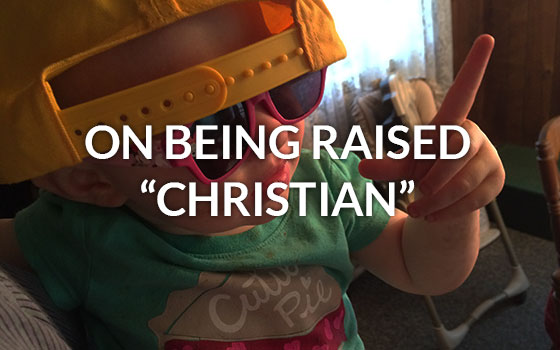
This post originally appeared on RobLaughter.com.
“I was raised Christian.”
You’d be surprised how many times I hear this one. I hear it from Christian friends and non-Christian friends alike. “I was raised Christian.”
Sometimes, they say something slightly different, like, “I was born Christian,” “I was raised Catholic,” or “I was born into the faith.” But the meaning is generally the same–they mean to say that they were raised in a Christian home, or that their parents were Christian, or at the very least, their parents went to church on Easter and Christmas.
Many of them are in fact Christians–they love the Lord, and they may not be able to point to any single point in time when they became Christians.
Others are non-Christians. But both groups make a dangerous assumption about the nature of Christianity, that is, that Christianity is a culture into which you are born. Which in one sense is true. You are born into Christianity, but not in the way that you think.
Let’s first look at what being “born” into Christianity isn’t.
Christianity isn’t a cultural phenomenon.
Religions like Judaism, Islam, and Hinduism are largely cultural phenomena. That is, if your parents belong to the faith, you belong to the faith.
I once had a roommate from India who happened to be Hindu. I enjoyed getting to know him and learning about his culture. I learned about his family, his hobbies, his food, his heritage. He occasionally joined me for church, interested to learn what I believed and why I was so excited about Jesus.
He was a genuinely nice guy, and we quickly became good friends.
One day, as we were riding together in his car, I noticed a small statue of a Hindu god that he kept on his dashboard.
“Who is that,” I asked?
He responded that it was his family’s idol, a small statuette that represented the god that his family worshipped. When I asked how he personally interacted with that god, he shared that he didn’t actively practice his faith but he was faithful to his religious customs and practices because if he were to depart from the faith, he would dishonor his mother and his father.
He maintained the appearance of being a devout follower of Hinduism. He attended temple worship regularly, he displayed statuettes of his family’s gods, and he even occasionally prayed. But his faith was only skin deep. His heart wasn’t in it. It was easier to fool his parents into thinking he was still actively involved in his faith than it was to deal with the heartbreak they would experience if he told them otherwise.
He wouldn’t dare tell them his parents this, but he was a merely a cultural Hindu.
American Christianity is no different.
You may respond, “Christianity is different!” And you would be correct. But the brand of “Christianity” that we have created in America is not Christianity–not by a long shot.
To be a Christian, one must personally repent of his or her sins and trust in Jesus entirely for their salvation. It’s personal, not cultural. Being baptized as a child, going to church, or being raised in a “Christian” home don’t take the place of a personal saving relationship in humble obedience to Jesus Christ.
Many American Christians are no different than my dear roommate. They go to church with some degree of consistency, they have the Jesus fish eating the Darwin fish on the back of their cars, they know a few bible verses, and they may even pray to some being they call “god.”
But their faith is only skin deep. They may have been raised in a Christian home. They may have devout Christian parents. They may have been involved in church their whole lives.
But they are not Christians, and they don’t have the heart to share with their parents that they don’t share their faith.
No one was born a Christian.
As theologian R.C. Sproul points out, no one was born a Christian. Everyone who is, or ever has been, or ever will be a Christian is a convert to Christianity. That’s because, unlike many other world religions, Christian faith isn’t hereditary. It’s not something that’s immediately conferred to a child by his or her parents at birth.
Now, we’d like to treat it this way. We baptize babies, we “commit them to the Lord” in “dedication” ceremonies, and we generally assume that our kids are Christian if they walk the walk, talk the talk, and wave the Jesus flag in their youth groups.
But this can’t be farther from reality. In John’s gospel, Jesus tells a man named Nicodemus, “Truly, truly, I say to you, unless one is born again, he cannot enter the Kingdom of Heaven.”
Nicodemus, who I imagine was just as confused as I was when I read that for the first time, asks, “How can a man be born when he is old? Can he enter a second time into his mother’s womb and be born?”
Jesus responds, “Unless one is born of water and the Spirit, he cannot enter the kingdom of God. That which is born of the flesh is flesh, and that which is born of the Spirit is spirit.”
Herein lies the point of clarification. Christians are in fact born into the faith, not through their natural birth but through a supernatural birth in the Holy Spirit.
A Christian is not someone who goes to church and does all of the religious “stuff.” A Christian is a messed up human being like anyone else who has been given new life by the Spirit of God to turn from a life of sin and rebellion against the Creator God of the universe, put his or her faith in the work of Jesus on the cross, and put to death his or her sin in order to live life according to the will of God.
The true mark of a Christian is supernatural conversion. The only difference is that a Christian has been touched by the grace of God and, while he or she was once spiritually dead and separated eternally from God, he has been made alive again by a power over which he has no control.
We must not assume that we are Christians.
We must not rely on the faith of our parents. We must not assume that someone is Christian just because they walk the walk and talk the talk.
No one is “born Christian.” No one is “raised Christian.” One’s Christian parents, one’s religious practices, or one’s spending the days of his or her youth in a Christian home does not make that person a Christian. Only the Holy Spirit can “make” someone a Christian.
So if you call yourself a Christian–or if you don’t–and you have not yet put the complete weight of your trust in Jesus–a man who claimed to be God and who died a brutal death on the cross to pay the price for your rebellion against God, being buried in a tomb and permanently defeating sin and death by being raised to life three days later–I urge you to give it a try.

Recent Comments